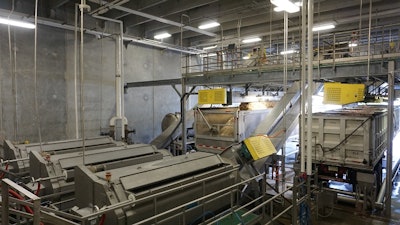
A Tyson Foods Inc. plant in its hometown of Springdale, Arkansas, takes extra steps to control its odor and environmental impact.
As part of the 2022 U.S. Poultry & Egg Association’s Clean Water Awards, Tyson’s facility in Springdale, Arkansas, received an honorable mention with distinction award in the pre-treatment category.
The pre-treatment category covers facilities that discharge pretreated effluent to a publicly owned, full treatment facility for further treatment. To be eligible, a facility must have a minimum of two years in which no significant non-compliances, notices of violations or any other type of enforcement action happened. Judging is based upon training, unique processes utilized for treatment, community outreach, wildlife management, water conservation and general environmental stewardship.

Water pre-treatment
The pre-treatment facility at Tyson’s Berry Street location handles 1.18 million gallons of wastewater per day from the plant, which processes about 200,000 birds at an average weight of 7.35 pounds and further processes another 350,000 pounds of meat daily.
In April 2019, the plant completed a significant, $14.5 million improvement to its offal and wastewater treatment facilities. This program included new offal screens and augars, aeration units, a equalization tank and a cover and scrubber system for the tank. These upgrades elevated the cleanliness of the area.
The plant is one of many Tyson facilities located in Springdale and Northwest Arkansas. Skye Rose, complex environmental manager at Tyson Berry Street, said that puts pressure on the facility to control odors. To mask the smell of the aeration basin process at the facility, a dome cover was placed on the equalization tank and an odor control system using a vaporized, proprietary odor-neutralizing chemical solution was installed.
The Berry Street pre-treatment operation also uses an auto-decanter to thicken its sludge. The substance is skimmed of the top of the dissolved air flotation (DAF) unit into the decanter for gravity separation. A skimmer system inside the decanter scrapes the driest sludge off the top, reducing its overall moisture content significantly.
Overall, the decanter limits water sent out for land application and reduces the total number of sludge loads to be hauled away by tanker trucks. This saves money for Tyson and reduces fuel costs and overall emissions.
Pilgrim’s Gainesville, Georgia, gains from improvements www.WATTAgNet.com/articles/43820
















